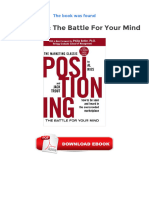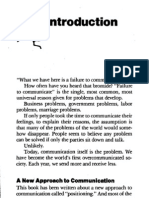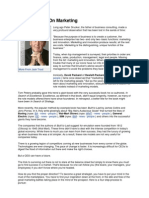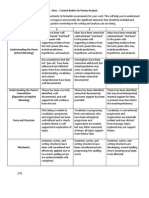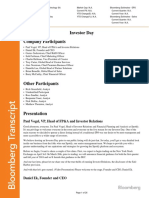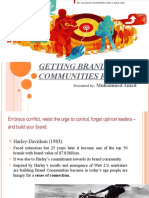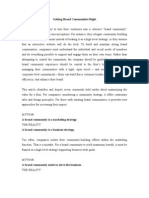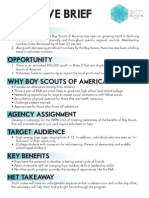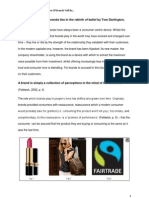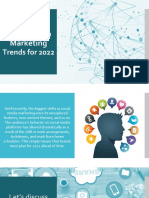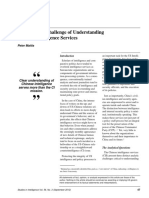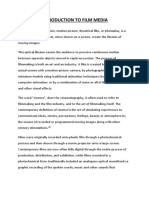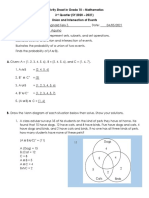75th Jack Trout
75th Jack Trout
Uploaded by
Henry LuuCopyright:
Available Formats
75th Jack Trout
75th Jack Trout
Uploaded by
Henry LuuCopyright
Available Formats
Share this document
Did you find this document useful?
Is this content inappropriate?
Copyright:
Available Formats
75th Jack Trout
75th Jack Trout
Uploaded by
Henry LuuCopyright:
Available Formats
expert perspectives
amas 75 years in marketing history
By JaCK TrOuT
editor@ama.org
Positioning Myopia
Jack trout speaking at a recent seminar in beijing
JaCK TrOuT is president of trout & partners ltd., an international marketing consultancy based in old greenwich, conn. he has consulted for companies such as hewlett-packard, southwest airlines, merck, procter & gamble, and papa Johns, among many others.
trout has authored and co-authored several books, including Positioning: The Battle for Your Mind; The 22 Immutable Laws of Marketing; Dierentiate or Die; and Big Brands. Big Trouble. his most recent book, Repositioning: Marketing in an Era of Competition, Change and Crisis, was published in 2009.
Editors note: In 1969, noted marketing strategist Jack Trout wrote an article in which he introduced the industry-changing concept of positioning and subsequently co-authored a book with Al Ries on the topic. Forty years later, Trout released a book that moves the ball forward, called Repositioning: Marketing in an Era of Competition, Change and Crisis. In this exclusive column for Marketing News, Trout distills some of his insights down to demonstrate positionings continued importance to the marketing discipline.
outruns the slow horse of meaning. Complicated answers dont help anybody. Every executive wants information because the difference between a decision and a guess often comes down to information, but todays executives dont want to be buried alive in printouts and reports. So it is with your marketing.
3. minds are insecure.
ver the years, positioning has become a highly used word in marketing, but as I watch what companies say, I wonder if anyone understands what Ive been writing about these many years. That said, maybe its time to clarify things: Positioning is how you differentiate yourself in the mind of your prospect. Its also a body of work on how the mind works in the process of communications. The first words on this subject go back to 1969 when I wrote an article in Industrial Marketing magazine entitled Positioning is a game people play in todays me-too marketplace. (Heres an untold secret: I chose the word positioning because of a dictionarys definition of strategy: Finding the most advantageous position against the enemy.) Since then, Ive written a number of books on the subject, but let me boil it down to the five most important elements in the positioning process.
Minds tend to be emotional, not rational. Why do people buy what they buy? Why do people act the way they do in the marketplace? According to psychologists Robert Settle and Pamela Alreck in their book Why They Buy, customers dont know, or they wont say. When you ask people why they made a particular purchase, the responses they give are often not very accurate or useful. That may mean that they really do know, but theyre reluctant to tell you the right reason. More often, they really dont know precisely what their own motives are. My experience is that people dont know what they want. (So why ask them?) More times than not, people buy what they think they should have. Do most people really need a four-wheel-drive vehicle? (No.) If they did, why didnt they become popular years ago? (Not fashionable.)
knew exactly what was being served. But in the past decade, Budweiserand Miller and Coorshave flooded the market with regulars, lights, drafts, clears, coldbrewed, dry-brewed and ice-brewed beers. Now the statement This Buds for you can only elicit the question, Which one do you have in mind? Extending brand equity has become all the rage, as companies like Coca-Cola talk about concepts such as megabrands. But such line extensions just exacerbate consumers loss of focus. In our 1972 Advertising Age articles, Al Ries and I cautioned companies not to fall into what we called the line extension trap. For years, we were the lone voices railing against line extensions. Even the Journal of Consumer Marketing noticed this: Ries and Trout stand alone as the only outright critics of the practice of brand extension. (Our minds dont change.) Thats until the Harvard Business Review rendered their verdict: Unchecked product-line extension can weaken a brands image, disturb trade relations and disguise cost increases. Keep it up, guys.
stand for something: Be a well-focused specialist.
4. minds dont change.
1. minds are limited.
Like the memory bank of a computer, the mind has a slot or position for each bit of information that it has chosen to retain. In operation, the mind is a lot like a computer, but there is one important difference: A computer has to accept what you put into it; the mind does not. The human mind rejects information that does not match its prior knowledge or experience, but it doesnt have much prior knowledge or experience to work with. In our over-communicated society, the human mind is a totally inadequate container, so you must be very careful with your message and be aware of what is already in the mind about you and your competitors.
2. minds hate confusion.
Whats the secret to being remembered? To keep it simple. We tend to think of boredom as arising from a lack of stimuli, a sort of information underload. But more and more commonly, boredom is arising from excessive stimulation or information overload. Its a problem of complexity. Information, like energy, tends to degrade into entropy, into just noise, redundancy and banality. To put it another way, the fast horse of information
A general feeling in the marketing industry has always been that new-product advertising should generate higher interest than advertising for established brands. But it turns out that were actually more impressed by what we already know (or buy) than by whats new. With thousands of different commercials across hundreds of different brands, you can pretty much rule out creativity as the difference in persuasion. A book entitled Attitudes and Persuasion, by Richard Petty and John Cacioppo, spends some time on why minds are so hard to change: The nature and structure of belief systems is important from the perspective of an informational theorist because beliefs are thought to provide the cognitive foundation of an attitude. In order to change an attitude, then, it is presumably necessary to modify the information on which that attitude rests. It is generally necessary, therefore, to change a persons beliefs, eliminate old beliefs or introduce new beliefs. And youre going to do all that with a 30-second commercial?
5. minds can lose focus.
In days gone by, most big brands were clearly perceived by their customers. The mind, like a camera, had a very clear picture of what its favorite brands were all about. When Anheuser-Busch proudly proclaimed that This Buds For You! the customer
In an increasingly competitive world, the well-focused competitor is usually the winner. The specialist can focus on one product, one benefit, one message, which enables the marketer to put a sharp point on the message that quickly drives it into the mind. Castrol can focus on its oil for high-performance small engines. Pennzoil and Quaker State are marketed for all types of engines. Another weapon of the specialist is the ability to be perceived as the expert or the best. Philadelphia is the best cream cheese. (The original, so to speak.) Finally, the specialist can become the generic for the category. Xerox became the generic word for copying. 3Ms Scotch tape became the generic word for cellophane tape. And now an online search comes down to, Google it. Even though the lawyers hate it, making the brand name a generic is the ultimate weapon in the marketing wars, but its something only a specialist can do. The generalist cant become a generic. Nobody ever says, Get me a beer from the GE. While America has to re-learn positioning, China has decided to learn it. Recently, Peking University in China has put my positioning strategy material into its business school curriculum. China is moving from manufacturing to marketing with a vengeance. Look out, world. m
34
marketing news | march 15, 2012
You might also like
- Negotiation AssignmentDocument11 pagesNegotiation Assignmentgo2gaurav133589% (18)
- Positioning The Battle of Your MindDocument4 pagesPositioning The Battle of Your MindGhulam JailanNo ratings yet
- Ries and Trout-PositioningDocument10 pagesRies and Trout-Positioningbkdheeraj88No ratings yet
- Session Plan LO1 Bookkeeping NC IIIDocument5 pagesSession Plan LO1 Bookkeeping NC IIIAaron Jed90% (10)
- BURT, Jonathan. Rat PDFDocument192 pagesBURT, Jonathan. Rat PDFsegataufrnNo ratings yet
- Distill Ventures Whisky White Paper WebDocument26 pagesDistill Ventures Whisky White Paper WebMustafa ParmaksizNo ratings yet
- High Five Business Plan V 20Document30 pagesHigh Five Business Plan V 20Adeel Sabir ZadranNo ratings yet
- A Stakeholder-Unifying, Cocreation Philosophy of MarketingDocument6 pagesA Stakeholder-Unifying, Cocreation Philosophy of MarketingKarnYoNo ratings yet
- Trader Joes Full Media PlanDocument48 pagesTrader Joes Full Media Planapi-307497560No ratings yet
- Contemporary Artisan and Design in Afrika PDFDocument111 pagesContemporary Artisan and Design in Afrika PDFCraft AfrikaNo ratings yet
- Peter Drucker On MarketingDocument3 pagesPeter Drucker On MarketingUrvashi Vaid0% (2)
- Repositioning (Review and Analysis of Trout and Rivkin's Book)From EverandRepositioning (Review and Analysis of Trout and Rivkin's Book)Rating: 5 out of 5 stars5/5 (1)
- Class-Created Rubric For Poetry AnalysisDocument1 pageClass-Created Rubric For Poetry Analysisapi-204719782No ratings yet
- Section 1 - Curriculum VitaeDocument5 pagesSection 1 - Curriculum Vitaetareque.mehdiNo ratings yet
- Book Review On All Marketers Are LiarsDocument13 pagesBook Review On All Marketers Are LiarsNeha JoshiNo ratings yet
- NCBJDocument32 pagesNCBJCatawba Security100% (1)
- Seen Presents - Alcohol Trends ReportDocument25 pagesSeen Presents - Alcohol Trends ReportAnonymous rjJZ8sSijNo ratings yet
- Colette Concept StoreDocument15 pagesColette Concept Storealyaandreeva2001No ratings yet
- The Chocolate Tree: A Natural History of Cacao: Allen M. Young, Gainesville: University Press of FloridaDocument2 pagesThe Chocolate Tree: A Natural History of Cacao: Allen M. Young, Gainesville: University Press of FloridaEmmanuel AuguisNo ratings yet
- The Objectivity Trap Spreads v2Document56 pagesThe Objectivity Trap Spreads v2Lydia TariganNo ratings yet
- Creative Lenses Models To Manifestos V2Document103 pagesCreative Lenses Models To Manifestos V2Jelena Lecic MirceticNo ratings yet
- 2007 Stefan Sagmeister - Manifesto - ICONDocument1 page2007 Stefan Sagmeister - Manifesto - ICONMirela DuculescuNo ratings yet
- The Effects of Cryptocurrency Wealth On Household Consumption and InvestmentDocument66 pagesThe Effects of Cryptocurrency Wealth On Household Consumption and InvestmentBenoît PellevoizinNo ratings yet
- Overview of The Game IndustryDocument9 pagesOverview of The Game IndustryTanisha JhandichaurNo ratings yet
- Marketing Strategy For Millennial of AlcoholDocument8 pagesMarketing Strategy For Millennial of AlcoholKetan BedekarNo ratings yet
- Ogilvy On AdvertisingDocument20 pagesOgilvy On AdvertisingLarus PokloniNo ratings yet
- Spotify TranscriptDocument26 pagesSpotify Transcriptlopaz777No ratings yet
- Getting Brand Communities RightDocument21 pagesGetting Brand Communities Rightmuhammadamad8930100% (1)
- VeryGoodCopy Micro-EssayDocument21 pagesVeryGoodCopy Micro-Essayaspriha mandal100% (1)
- 2023 Trends Report: Realities EdgeDocument53 pages2023 Trends Report: Realities EdgeKevin ZengelNo ratings yet
- SummerIssue 9-July PROOFDocument24 pagesSummerIssue 9-July PROOFlewis_swattNo ratings yet
- Bensdorp 2pp A5 Product Sheet - EbonyDocument2 pagesBensdorp 2pp A5 Product Sheet - EbonymilkyslumberNo ratings yet
- Getting Brand Communities RightDocument4 pagesGetting Brand Communities Rightmum830No ratings yet
- Confectionery Science and Technology-Páginas-21-55Document37 pagesConfectionery Science and Technology-Páginas-21-55judithNo ratings yet
- Creative BriefDocument1 pageCreative Briefchelseabada100% (1)
- Ogilvy - Social CRM AnalysisDocument49 pagesOgilvy - Social CRM AnalysisFlorin BucaNo ratings yet
- Advertising Age Handbook of AdvertisingDocument418 pagesAdvertising Age Handbook of AdvertisingAdela Netoi0% (1)
- Jungle Scout Consumer Trends Report Q3 2021Document45 pagesJungle Scout Consumer Trends Report Q3 2021mramininiNo ratings yet
- Target Audience Profile PDFDocument3 pagesTarget Audience Profile PDFim1iconNo ratings yet
- Mondo.2000.Issue.04.1991 TextDocument164 pagesMondo.2000.Issue.04.1991 TextmarkargentNo ratings yet
- Influencer MarketingDocument15 pagesInfluencer MarketingOurveshi RuchaNo ratings yet
- Illy Sustainability-Report-2022 ENGDocument61 pagesIlly Sustainability-Report-2022 ENGjay.arte100% (1)
- 1283273291NM MarketPlace Sep 10 - Zone 2Document60 pages1283273291NM MarketPlace Sep 10 - Zone 2CoolerAdsNo ratings yet
- The Winning Edge, Inc. - Case StudyDocument4 pagesThe Winning Edge, Inc. - Case Studyanon_389892490No ratings yet
- Instagrams Brand Building PlaybookDocument12 pagesInstagrams Brand Building Playbookoverflow100% (1)
- Red Bull PDFDocument20 pagesRed Bull PDFHarsha NssNo ratings yet
- Jamil QureshiDocument4 pagesJamil Qureshibobelu100% (1)
- Newsweek International - 24 December, 2021 - DikompresiDocument60 pagesNewsweek International - 24 December, 2021 - DikompresiJulendra AriatedjaNo ratings yet
- The Untold Rise of Leila Hormozi 1710790948Document10 pagesThe Untold Rise of Leila Hormozi 1710790948kNo ratings yet
- The Wall Street Journal Europe 2011.08.18Document32 pagesThe Wall Street Journal Europe 2011.08.18Viet AnhNo ratings yet
- Module 1 - The Future of Brands - Tom Darlington June 2011Document10 pagesModule 1 - The Future of Brands - Tom Darlington June 2011tomdarlingtonNo ratings yet
- TSC Brand Guidelines 2019 2020Document32 pagesTSC Brand Guidelines 2019 2020Daniela BandaNo ratings yet
- Podcasting, The 5Ws and YouDocument9 pagesPodcasting, The 5Ws and YoupulkquistNo ratings yet
- Word FileDocument10 pagesWord FileAbhisek Kumar AgrawalNo ratings yet
- Competitor Strategies in Alcoholic DrinksDocument37 pagesCompetitor Strategies in Alcoholic DrinksJimenez Vargas Jorge AntonioNo ratings yet
- Billion Dollar SummitDocument509 pagesBillion Dollar SummitRNo ratings yet
- Mattis-Understanding Chinese Intel PDFDocument11 pagesMattis-Understanding Chinese Intel PDFAdriano RochaNo ratings yet
- Authorpreneur - Build The Brand, Business, and Lifestyle You Deserve. It - S Time To Write Your BookDocument87 pagesAuthorpreneur - Build The Brand, Business, and Lifestyle You Deserve. It - S Time To Write Your BookJoshua CoverstoneNo ratings yet
- Running Head: Trader Joe's Job Satisfaction Case Study 1Document8 pagesRunning Head: Trader Joe's Job Satisfaction Case Study 1S ChettiarNo ratings yet
- Whats Next in Marketing Advertising 1206247156803190 3Document91 pagesWhats Next in Marketing Advertising 1206247156803190 3AlexandraAndoneNo ratings yet
- Guide Communitytreasurers PDFDocument44 pagesGuide Communitytreasurers PDFDengAwutNo ratings yet
- Differentiate or Die (Review and Analysis of Trout and Rivkin's Book)From EverandDifferentiate or Die (Review and Analysis of Trout and Rivkin's Book)No ratings yet
- Brand Seduction: How Neuroscience Can Help Marketers Build Memorable BrandsFrom EverandBrand Seduction: How Neuroscience Can Help Marketers Build Memorable BrandsNo ratings yet
- Positioning, The Battle for Your Mind (Review and Analysis of Ries and Trout's Book)From EverandPositioning, The Battle for Your Mind (Review and Analysis of Ries and Trout's Book)Rating: 5 out of 5 stars5/5 (5)
- Arketing Assignment: Running Head: Positioning-A Road To Position in Life and in BusinessDocument13 pagesArketing Assignment: Running Head: Positioning-A Road To Position in Life and in BusinessGanapathy NamasivayamNo ratings yet
- Introduction To Film MediaDocument3 pagesIntroduction To Film MediaKhuzaima MahmoodNo ratings yet
- Hbo Final Lecture - Conflict and NegotiationDocument4 pagesHbo Final Lecture - Conflict and NegotiationRhen Tomboc Olasiman-MateoNo ratings yet
- Public Participation & Conflict ManagementDocument47 pagesPublic Participation & Conflict ManagementMichelle YuNo ratings yet
- Chapter 3 NewDocument6 pagesChapter 3 NewVianne SaclausaNo ratings yet
- Yady EronduDocument4 pagesYady EronduAnonymous BRwwtJFwdy100% (1)
- Expositary EssayDocument4 pagesExpositary Essayxumuqvwhd100% (2)
- Acting The Metaphor The Laban-Malmgren System of Movement Psychology and Character AnalysisDocument31 pagesActing The Metaphor The Laban-Malmgren System of Movement Psychology and Character AnalysisJenna Zhu100% (1)
- Upgrad + PGD+ML+BrochureDocument8 pagesUpgrad + PGD+ML+BrochureRayvonNo ratings yet
- One Word SubstitutionDocument2 pagesOne Word Substitutionmondalpreetam9No ratings yet
- Result of DYC of Ist Batch 29.01.2019Document951 pagesResult of DYC of Ist Batch 29.01.2019Atul BajpaiNo ratings yet
- Written Assignment Unit5Document1 pageWritten Assignment Unit5NatnaelNo ratings yet
- A Case Study of Cognitive Behavioural Therapy For Social Anxiety 750Document6 pagesA Case Study of Cognitive Behavioural Therapy For Social Anxiety 750valeriaNo ratings yet
- Powergrid SipDocument62 pagesPowergrid SipmonNo ratings yet
- Pinheiro 2014Document7 pagesPinheiro 2014angieNo ratings yet
- Critical Reasoning & Moral Theory (Part 1) : Moodle Forum & NotesDocument7 pagesCritical Reasoning & Moral Theory (Part 1) : Moodle Forum & Notes白诗琪No ratings yet
- Advances in The Diagnosis and Treatment of AnhedoniaDocument58 pagesAdvances in The Diagnosis and Treatment of AnhedoniaMeriem KhatibNo ratings yet
- 2023 Career Roadmap Template (Editable)Document10 pages2023 Career Roadmap Template (Editable)Ebube IloNo ratings yet
- Quiz3 Q3Document3 pagesQuiz3 Q3Reginald Mundo100% (1)
- 2 National Innovation Talent Contest For Polytechnics: Nitttr, KolkataDocument1 page2 National Innovation Talent Contest For Polytechnics: Nitttr, KolkataVyasangNo ratings yet
- Math 4 DLP - Q3W4 Day 1Document3 pagesMath 4 DLP - Q3W4 Day 1Aira VillanuevaNo ratings yet
- Personal-Development 4Document5 pagesPersonal-Development 4Carl Angelo MartinNo ratings yet
- Breakthrough Leadership TransformingDocument48 pagesBreakthrough Leadership TransformingGeorge Marchan100% (1)
- Communication Module ReflectionDocument2 pagesCommunication Module Reflectionapi-490014939No ratings yet
- Research Proposal Assess The Safety Culture Awareness Among Managers Supervisors and Workers in Construction Site in Klang A Case Study at Hotwer de PDFDocument28 pagesResearch Proposal Assess The Safety Culture Awareness Among Managers Supervisors and Workers in Construction Site in Klang A Case Study at Hotwer de PDFMohamed SalahNo ratings yet
- NEO PI SummaryDocument13 pagesNEO PI SummaryEdielyn Gonzalvo GutierrezNo ratings yet

